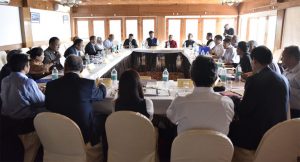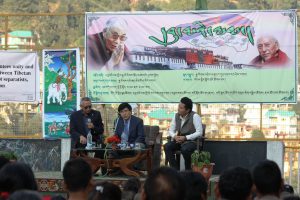
Task Force Meeting
A series of high profile meetings followed on from the Five-Fifty Forum, the three-day conference convened to discuss strategies to resolve the issue of Tibet, which took place on October 6-8 in Dharamshala.
First was the 29th Meeting of the Task Force on Sino-Tibet Negotiations, held in Dharamshala over October 9-10. Chaired by the Central Tibetan Administration President, Sikyong Lobsang Sangay, the meeting was attended by 18 members of the task force who discussed the recommendations made at the Five-Fifty Forum. Expressing his commitment to the Middle Way Approach, Sikyong Sangay heard suggestions on which future courses of action would be best to pursue in light of the upcoming 19th Congress of the Chinese Communist Party. In addition, the task force discussed plans for the 2018 “Thank You” year, which will mark 60 years of Tibetan exile and thank India and other allies who have supported the Tibetans throughout this trying period.

Professor Ming Xia speaking on the Middle Way Approach at Yongling School
Photo: Kunsang Gashon / phayul
Next, on October 12, a public event was held at Yongling School, organised by six Dharamshala-based Tibetan organisations. Here, Professor Ming Xia, who teaches Political Science at City University of New York (CUNY) addressed the crowd, telling them that he has “complete faith” in the Dalai Lama’s non-violence approach, and that they should stay hopeful about the Middle Way Approach: “Nothing is permanent. So, the repressive policies in Tibet will change”. During his speech, he noted some liberalisation of China’s policies and of its approaches to ethnic minorities, remarking that the One Child Policy had been abolished and also that increasing numbers of Chinese people were turning to Buddhism. Despite his positive message, Xia has not returned to China for nine years and has been confronted by the Chinese secret service, who have warned him not to support the non-violent Mdiddle Way Approach.
Between October 13-18, the fifth Annual Meeting of Chinese Liaison Officers of the Central Tibetan Administration took place, again in Dharamshala, attended by Sikyong Sangay and Professor Ming Xia. Sikyong Sangay declared that the success of the Middle Way Approach depended on how the Chinese public understood the issue. He stressed how important it was for Tibetans to know the Chinese language, to better communicate their aims with Chinese students, teachers, and intellectuals. However, Sangay also warned that “some Chinese officials claim they have Tibetans in exile on their payroll”, stressing that Chinese government staff must be approached with caution.
On October 18, as the Chinese Liaison Officers meeting concluded, the 19th National Congress of the Chinese Communist Party began in Beijing. With 2,200 members in attendance, the meeting saw the party select its top leadership for the next five years. Few had doubted that Xi Jingping would remain in power for another term as Secretary-General. In his opening speech, Jingping disparaged separatism from the Chinese motherland, an apparent reference to Tibet, and also Xianjing, Taiwan and Hong Kong.




 Print
Print Email
Email